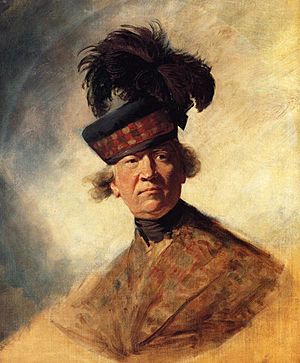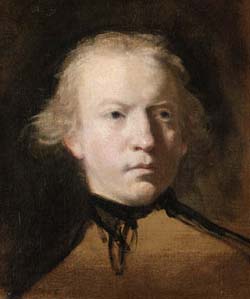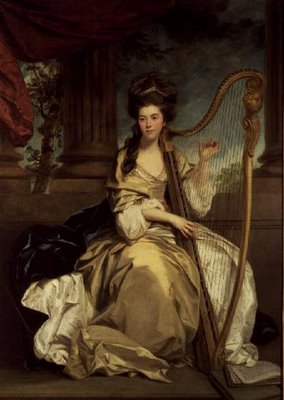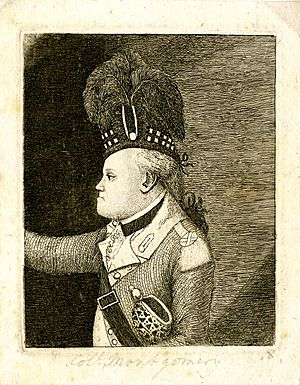Archibald Montgomerie, 11th Earl of Eglinton facts for kids
Quick facts for kids
The Earl of Eglinton
|
|
|---|---|
 |
|
| Member of Parliament for Ayrshire |
|
| In office 1761–1762 |
|
| Member of Parliament for Wigtown Burghs |
|
| In office 1761–1768 |
|
| Personal details | |
| Born | Winchester College]] 18 May 1726 Ayrshire, Scotland |
| Died | 30 October 1796 (aged 70) Eglinton Castle, Scotland |
| Resting place | Winchester College]] |
| Political party | Whig |
| Spouses | Jean (Jane) Lindsay (1772–1778) Frances Twysden (1783–1796) |
| Children | 2 daughters |
| Parents | Alexander Montgomerie, 9th Earl of Eglinton Susanna Kennedy |
| Alma mater | Eton< |
Archibald Montgomerie, 11th Earl of Eglinton (born May 18, 1726 – died October 30, 1796) was an important Scottish leader. He was a high-ranking General in the army and also a member of parliament (MP). This means he helped make laws in the British Parliament. He was also the head, or Clan Chief, of the Clan Montgomery. Montgomerie fought in the Seven Years' War and even served alongside George Washington. He was also a supporter of the famous poet Robert Burns.
Contents
Early Life and Education
Archibald Montgomerie was born on May 18, 1726. His parents were Alexander Montgomerie, 9th Earl of Eglinton and Susanna Kennedy. Archibald was one of their many children.
He went to school at Eton and then Winchester College. These were very famous schools. When he was just 13 years old, Archibald decided to join the army.
Military Career and Adventures
After joining the army, Archibald quickly moved up in rank. He started as a Cornet in the Scots Greys in 1739. By 1757, he was a Lieutenant-Colonel.
When the Seven Years' War began, Montgomerie formed his own regiment called the Montgomerie's Highlanders. In 1757, his regiment sailed to the American Colonies. There, he worked under General Amherst.
In 1758, Montgomerie and his soldiers joined George Washington and Henry Bouquet. They went on an important mission against Fort Duquesne. Later, in 1760, he led a group of 1,200 men against the Cherokee people during the Anglo-Cherokee War. His mission was difficult, but his forces caused a lot of damage to several Cherokee villages, including Keowee. However, he was defeated by the Cherokees at the Battle of Echoee in 1760 and had to retreat.

Montgomerie continued to serve in the British army for many years. He became a Major General in 1772 and a Lieutenant General in 1777. By 1793, he was a Full General, which is a very high rank. He was also in charge of the Royal Scots Greys (2nd Dragoons) from 1795 to 1796.
Political Life and Becoming an Earl
In 1761, Montgomerie became a member of parliament (MP) for the Whig party. He was elected to represent two areas but chose to represent Ayrshire. He served in the House of Commons from 1761 to 1768.
He also held several important positions. In 1761, he became an Equerry for Queen Charlotte. This meant he was a personal attendant to the Queen. He was also made Governor of Dumbarton Castle in 1764.
A big change happened in Montgomerie's life in 1769. His brother, Alexander Montgomerie, 10th Earl of Eglinton, passed away. Because of this, Archibald inherited the title and became the 11th Earl of Eglinton.
As an Earl, he continued to be active in public life. He was the Grand Master of the Masonic Lodge of Lodge Mother Kilwinning for many years. He was also chosen several times to be one of the sixteen Scottish representative peers. These peers represented Scotland in the British Parliament.
He became Governor of Edinburgh Castle in 1782. He also served as the Lord Lieutenant of Ayrshire from 1794 to 1796. Archibald Montgomerie was a good friend and supporter of the famous Scottish poet Robert Burns. They stayed in touch until Montgomerie's death.
Archibald Montgomerie passed away on October 30, 1796, at Eglinton Castle. His title, the Earldom, went to a distant cousin. However, most of his money and property went to his daughter, Mary. Her son later became the 13th Earl of Eglinton.
There is a portrait of Montgomerie at Windsor Castle. The King offered to return it to the family, but the 13th Earl said no. He felt it was an honor for his grandfather's portrait to be in such a famous place.
Family Life
Archibald Montgomerie was married two times. His first wife was Lady Jean (Jane) Lindsay. They married on March 30, 1772. Sadly, Jean passed away in 1778, and they did not have any children.
On August 9, 1783, he married Frances Twysden as his second wife. They later divorced in 1788.
Archibald and Frances had two children:
- Lady Mary Montgomerie (born March 5, 1787 – died June 12, 1848). Mary married Lord Hugh Montgomerie. Their son, Archibald Montgomerie, 13th Earl of Eglinton, later inherited the Earldom. Through Mary, the family lines of the Montgomerie family came together again.
- Lady Susanna Montgomerie (born May 26, 1788 – died November 16, 1805). Susanna passed away when she was young and was never married.
See Also
 | Victor J. Glover |
 | Yvonne Cagle |
 | Jeanette Epps |
 | Bernard A. Harris Jr. |



